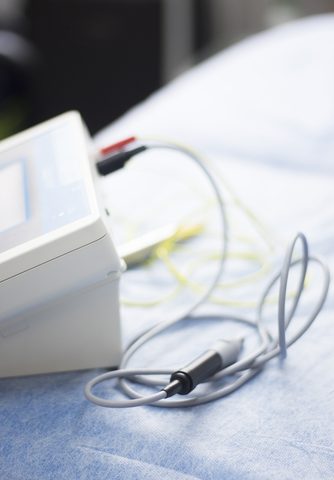Electro-acupuncture, a form of acupuncture where a small electric current is passed between pairs of acupuncture needles, may be effective in providing relief for nocturnal hot flashes in breast cancer survivors.
The study, “Comparative effectiveness of electro-acupuncture versus gabapentin for sleep disturbances in breast cancer survivors with hot flashes: a randomized trial,” was published in the journal Menopause.
Breast cancer survivors often enter premature menopause as a result of chemotherapy treatments and surgery. This, together with the estrogen deficiency that is associated with certain breast cancer drugs such as tamoxifen and aromatase inhibitors, makes breast cancer survivors at a higher risk of experiencing persistent hot flashes. Nocturnal hot flashes, in particular, are the most problematic as they often interrupt sleep.
Researchers examined the effects of electro-acupuncture (EA) compared to gabapentin (Neurontin, a drug used to treat several conditions, including seizures and hot flashes) for sleep disturbances in 58 breast cancer survivors who experienced hot flashes at least two times every day.
Participants were randomly assigned to receive eight weeks of EA or gabapentin (900 mg daily). The primary endpoint was a change in the total Pittsburgh Sleep Quality Index (PSQI) score between groups at week eight. PSQI is a self-report questionnaire that assesses sleep quality over a one-month time interval. The measure consists of 19 individual items. Secondary endpoints included specific PSQI sleep quality domains.
At week eight, results showed that the mean reduction in PSQI total score was significantly higher in the EA group compared to the gabapentin group. After that, the EA group had improved sleep duration, decreased daytime dysfunction, shorter sleep latency, less sleep disturbance, improved sleep efficiency, and better sleep quality, whereas the gabapentin group only showed improvement in duration and sleep quality.
Poor sleep is particularly bothersome for breast cancer survivors experiencing nocturnal hot flashes, as it increases levels of pain, fatigue, depression, and anxiety. Although participants in the EA group had improvements in their sleep, the researchers noted that sleep quality for the participants was still not as good as it should be. In this context, more studies are required to examine possible combinations of pharmacologic and nonpharmacologic therapies.
“This study shows that, for women who need or choose to avoid medications, electro-acupuncture may be an option because it has minimal risks, but blinded controlled trials are needed,” Dr. JoAnn Pinkerton, executive director of The North American Menopause Society (NAMS), said in a news release.

